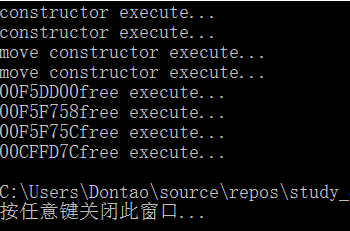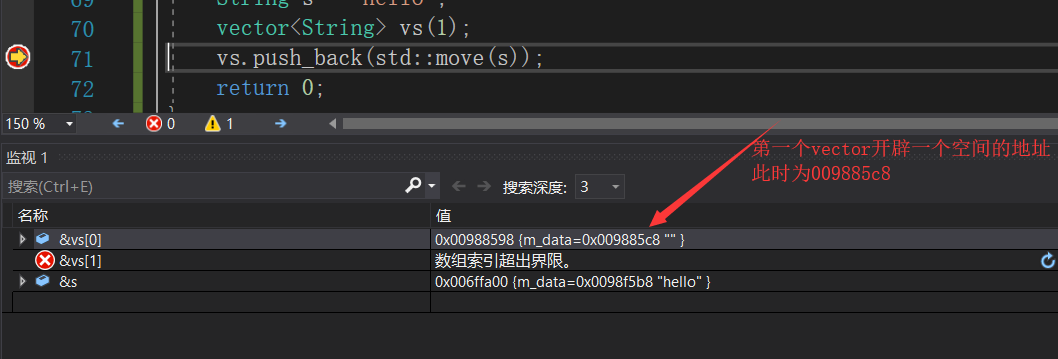移动构造函数应用的场景????
答:有时候我们会遇到这样一种情况,我们用对象a初始化对象b,后对象a我们就不在使用了,但是对象a的空间还在呀(在析构之前),既然拷贝构造函数,实际上就是把a对象的内容复制一份到b中,那么为什么我们不能直接使用a的空间呢?这样就避免了新的空间的分配,大大降低了构造的成本。这就是移动构造函数设计的初衷。
例子示下:
#include<string> #include<vector> using namespace std; class String; ostream& operator<<(ostream& out, String& s); class String { public: friend ostream& operator<<(ostream& out, String& s); public: String(const char* data = "") { if (data == NULL) { m_data = new char[1]; m_data[0] = '�'; } else { m_data = new char[strlen(data) + 1]; strcpy(m_data, data); } cout << "constructor execute..." << endl; } String(String &&s)noexcept { cout << "move constructor execute..." << endl; m_data = NULL; this->m_data = s.m_data; s.m_data = NULL; } ~String() { cout << this<<"free execute..." << endl; if(m_data != NULL) delete[] m_data; } private: char* m_data; }; ostream& operator<<(ostream& out, String& s) { out << s.m_data; return out; } int main() { String s = "hello"; vector<String> vs(1); vs.push_back(std::move(s)); return 0; }
执行结果:

解析运行结果:
1、第一个 “默认构造函数” 是因为vector<String> vs(1) , 所以事先使用默认构造函数构造了一个Test对象
2、第二个 “默认构造函数” 是因为Test t ,使用默认构造函数构造了一个对象
3、第三个 “移动构造函数” 大多数人会以为是 vec.push_back(std::move(s)) ,push_back 导致对象的移动而输出的。具体的原因其实是由于重新分配内存而导致的,我们的 vector 对象 vs 初始的容量只有 1 ,且里面已经有一个对象了,就是vector<Test> vs(1)的时候创建的,所以再向vs里面添加String对象时,就会导致vs重新分配内存。由于vs中的对象定义了移动构造函数且是可用的(因为我们将其声明为了noexcept),所以就会调用移动构造函数将vs中原始的那个对象移动到新的内存中,从而输出 “移动构造函数”。


4、第四个 “移动构造函数” 才是因为String对象 t 被移动到vector 对象 vs 新的空间而输出的
5、第五个 “析构函数” 是因为重新分配内存后,原来的内存将被销毁,所以输出一个“析构函数”
6、后面三个 “析构函数” 是因为执行了return 0, 内存被释放,vs 和 s 都被析构,所以输出三个 “析构函数
注意:

第四行的输出由 “移动构造函数” 变成了 “拷贝构造函数” ,原因是:
由于我们的移动构造函数没有声明为noexcept,所以我们的移动构造函数就会被认为是可能抛出异常,所以在重新分配内存的过程中,vs对象就会使用拷贝构造函数来“移动”对象(这里说的移动其实是拷贝,并不是移动),所以就输出了“拷贝构造函数”。